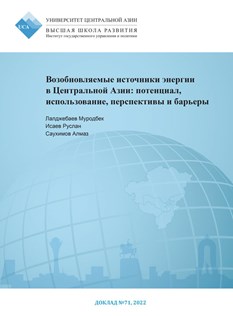Renewable Energy in Central Asia: Potential, Use, Outlook, and Barriers
Authors: Laldjebaev Murodbek, Isayev Ruslan, Saukhimov Almaz
Abstract: The paper presents a comprehensive concise review of the potential, use, implementation prospects and barriers to the development of renewable energy sources (RES), including small hydropower, solar, wind, geothermal and bioenergy, for five Central Asian countries - Kazakhstan, Kyrgyzstan, Tajikistan, Turkmenistan and Uzbekistan. Estimates of small hydropower potential range from 275,000 to 30,000 MW, solar power from 195,000 to 3,760,000 MW, wind power from 1,500 to 354,000 MW, geothermal power from 2 to 54,000 MW, and bioenergy from 200 to 800 MW. However, the scale of their use is small: 5-225 MW in small hydropower in five countries, and only Kazakhstan has introduced large-scale solar photovoltaic (>800 MW) and wind (>300 MW) capacities. Despite the fact that all of the above countries have strategies and programs to increase energy capacity, measures to implement them are not fully realized, with the exception of Kazakhstan and partly Uzbekistan. The development of renewable energy sources in the region is hampered by a number of barriers, including inadequate legal and regulatory frameworks, underdeveloped infrastructure, problems with finance, worker qualifications, public awareness and government support, as well as the availability of data and information. Since these obstacles are interconnected, an interdisciplinary and integrated approach is needed to overcome them. Renewable energy sources can help Central Asian countries meet the growing demand for energy and avoid the negative impact on the environment from the use of fossil fuels.
About the authors:
Laldjebaev Murodbek, Senior Lecturer, Department of Earth and Environmental Sciences, School of Arts and Sciences, UCA Khorog, Tajikistan, PhD in Natural Resources (Cornell University, USA), Master of Public Policy (Lee Kuan Yew School of Public Policy, NUS). Professional interests: research in economic geography, study of research methods, indigenous knowledge, sustainable energy and environmental management.
Isayev Ruslan, Associate Professor at the Department of Renewable Energy at the Kyrgyz State Technical University, PhD in Power Plants based on Renewable Energy Sources. He implemented a research project on energy efficiency and renewable energy at the School of Natural Resources and Environment at the Energy Institute of the University of Michigan, USA. Author of more than 40 scientific papers, including two monographs and two patents.
Almaz Saukhimov, Vice Rector for Science and Innovation, Almaty University of Energy and Communication named after G. Daukeev, Kazakhstan. PhD in Nanomaterials and Nanotechnologies (K. Satpayev KazNITU), master's degree in electrical engineering (AUES). Sphere of professional interests: development of science in the field of electricity, thermal energy, renewable energy sources, information and communication. Participated in the Energy Charter Secretariat of the Kazenergy Association 2014 in Brussels and presented an overview of the state policy of Kazakhstan in the field of energy conservation and energy efficiency. Author of more than 40 scientific and research projects for Kazakhstan and Central Asia.
Keywords: renewable energy, hydropower, solar energy, wind energy, geothermal energy, bioenergy, Central Asia.
JEL Codes: Q42



